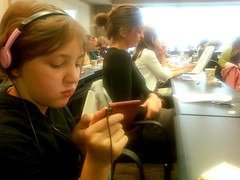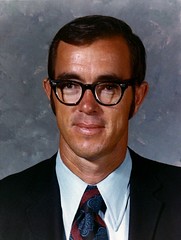 A few weeks ago, I was invited to speak to an autism book club at a large Baptist church here in Plano.
A few weeks ago, I was invited to speak to an autism book club at a large Baptist church here in Plano.Yeah, I know what you're thinking. I know because I thought the same thing. Well, two things come to mind, actually. The most immediate might just be that Schuyler isn't autistic. And that was the first thing that I pointed out to the organizer. But she assured me that it was fine, and that it was my experience with disability parenting that was important and the reason she wanted me to speak to her group.
I didn't mention the other thing, the fact that I'm not a Christian.
Well, no. I didn't mention it because while you may think whatever you like about my religious beliefs and the fact that I am not a Christian and am not raising my daughter to be one, the one thing you have to admit is true is that I have never pretended otherwise. I've never shied away from talking about my faith; my agnosticism has been an irritant to both my Christian and my non-believer friends alike.
My book surprised a lot of people (including me, honestly) because of the amount of ink I spilled discussing God. My Christian friends were disappointed that I didn't embrace Jesus at the end and instead described what was, at best, something of a truce with God. And my fellow heathens were puzzled by, well, the same thing. I may have been shaking my angry fists at the sky, but as my mother pointed out when she read it, at least I was still talking to God. We might be in need of couples counseling, but I hadn't dismissed the idea altogether.
Which is why I thought it sounded like a solid idea to talk to the Baptists. I haven't had very many positive dialogues with Christian groups like this in the past, but I'm not opposed to the idea. I assumed that the organizer of this book club had read the book and saw a deeper spiritual journey going on, and one that merited discussion with the faithful of her group.
Turns out, she hadn't read the book. Not yet.
As she made her way through the book, I could sense from her emails that she was troubled. I got several "I'm on page 154, and I've got some questions..." emails, which I tried to answer as best as I could. Particularly on the topic of my own beliefs, I said this:
For me as an agnostic, it is, in some ways, that lack of what others call "faith" that sustains me. It leaves open the possibility of something greater, something beyond my understanding, and it gives me hope that love is bigger than the cramped, mean world that we live in. And if I can't believe I know the nature or the origin of that love like the Christian believes, I also make room for it anyway. Which I suppose is its own kind of faith.
(...)
In the end, you know what's in your heart, and THAT'S the place where you keep your own faith. And while that sounds sort of lonely, I also find a great comfort in it.
I got uninvited to speak to her church's Autism Book Club.
I don't generally like to quote from private email, but since this event had already been publicized in advance (including by me) and my daughter's smiling face had already graced the club's website before being pulled without warning (before I was even officially uninvited), I feel like this one sentence of explanation is relevant. More to the point, it says a lot about, well, a lot.
"My book club is promoting Christianity as the answer to life's problems and that's what people are expecting when they walk in the door."
So there you go. Am I bitter? I don't like to think of myself as a bitter person, but yeah, I suppose I am, at least a little. Am I disappointed? Absolutely. But most of all, am I a little less likely to agree to a dialogue like this in the future? Does this feed my natural predisposition to distrust an agent of an organized Christian group? Yeah, it really does.
I have been asked on more than one occasion if I plan to teach Schuyler about Jesus, as if NOT doing so was somehow unAmerican. And I've been told that I am somehow limiting her future if I don't. Christians teach their kids what they believe, and while the best of them give them a choice, they still teach through their own biases. That's not even a bad thing. It's the nature of parenting, and it's part of how humans have built their tribes for thousands of years.
Well, for those questioners, I have good news, and I have bad news. The good news is that yes, we fully intend to teach Schuyler about Jesus Christ, among the other philosophers of history.
The bad news is that we intend to teach her about Christians, too. The good, the bad and the ugly. Because we're promoting information as the answer to life's problems.











